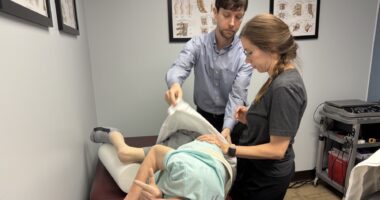Mothers Want to Improve Children’s Quality of Life

Mothers of children and adolescents with spinal muscular atrophy (SMA) want to find ways to improve the quality of life of their children and families, a questionnaire-based study reports.
“The results of this research … could help specialists in providing psychological support for families of SMA children and/or adolescents,” the researchers wrote.
The study, “Findings regarding emotion regulation strategies and quality of life’s domains in families having children with spinal muscular atrophy,” was published in the Journal of Medicine and Life.
SMA is characterized by progressive muscle atrophy (shrinkage) and weakness that leads to severe physical disabilities in affected individuals and a significant burden on their families, which can affect the quality of life.
However, few studies have investigated the emotional coping strategies used by families with children or adolescents with SMA.
Here, researchers based at the Dr. N. Robanescu National Clinical Center of Neurorehabilitation for Children in Romania aimed to determine whether emotion regulation strategies in SMA caregivers were related to quality of life.
“Identifying the emotional regulation strategies used by families with children and/or adolescents with SMA can also help specialists to find and offer solutions for better family psychological and social assistance,” the team wrote.
The study enrolled 33 mothers of children and/or adolescents with SMA, and their experiences were captured using two questionnaires: the PedsQL-Family Impact Module (PedsQL-FIM) and the Cognitive Emotion Regulation Questionnaire (CERQ).
PedsQL-FIM was composed of 36 items within eight domains, including physical functioning, emotional functioning, social functioning, cognitive functioning, communication, worry, daily activities, and family relationships. Each item was assessed on a five-point scale from 0 (never a problem) to 4 (almost always a problem). The total scores were transformed and reversed to a 0-to-100 point scale with higher scores reflecting better functionality.
CERQ was a 36-item questionnaire containing nine subscales, including self-blame, acceptance, rumination, positive refocusing, refocus on planning, positive reappraisal, putting into perspective, catastrophizing, and blaming others. Each item was assessed on a five-point scale ranging from 1 (almost never) to 5 (almost always), and high scores represented the most common coping strategies chosen.
Of the respondents, 39.2% were mothers of patients with SMA type 2, followed by mothers of those with SMA type 1 and SMA type 3, evenly distributed at 30.3%. Slightly more than half (51.6%) lived in urban areas, whereas the remaining were in rural locations. Most (69.7%) had a high school level of education or less and were married (78.8%).
Examination of the PedsQL-FIM questionnaire revealed that family relationships had the highest frequency of the maximum value, accounting for 21.2% of all participants, who reported they did not have “problems with family relationships, including communication, stress, and conflicts between family members, and difficulty making decisions and solving problems as a family,” the researchers wrote.
Statistical analysis of PedsQL-FIM alone found a strong correlation between better communication and social functioning, as well as more daily activities and higher cognitive functioning, and better family relationships and daily activities. Significant, but moderate, correlations were found between all other eight domains except for daily activities and worry.
CERQ data showed the highest score reported by 30.3% of mothers was for “positive refocusing” as a coping strategy, “thinking of nicer things and pleasant experiences, considering that it is essential to think of something nice instead of what has happened,” the scientists wrote.
The next-highest reported CERQ scores were for the subscales “putting into perspective” (27.3%) and “acceptance” (24.2%). “Acceptance of disease and search for solutions to improve the family’s condition were viewed as valuable strategies for better outcomes in children and/or adolescents with SMA and their families,” the scientists added. Almost all mothers (93.9%) said that others were not to blame for what happened.
Statistical analysis within CERQ coping subscales found a correlation between self-blame and catastrophizing, or assuming the worse will happen, which “could be caused by the stress due to the severity of the disease in families with SMA children,” the investigators wrote.
Additional correlations were seen between more acceptance and refocus on planning and putting into perspective, refocus on planning and positive reappraisal, as well as positive reappraisal and putting into perspective.
A comparison between PedsQL-FIM and CERQ found the strongest correlation between rumination — continuously thinking about the same thoughts — and worse emotional and cognitive functioning and family relationships.
Self-blame was negatively associated with worse social functioning and family relationships. Self-blame and communication also were linked, “suggesting that mothers could feel guilty about their child’s illness when others do not understand the family’s situation, have difficulty talking about the child’s health condition, and communicate with health professionals,” the team wrote.
“Our findings suggest that adequate family relationships can reduce their members’ self-blame and rumination to a small extent,” the team added.
“The positive correlations found between the adaptive strategies (acceptance, refocus on planning, putting into perspective, positive reappraisal) in our study group might indicate moderate interest in looking for solutions to improve the quality of life of SMA children and/or adolescents and their entire families,” the authors concluded.
The post Mothers Want to Improve Children’s Quality of Life appeared first on SMA News Today.


